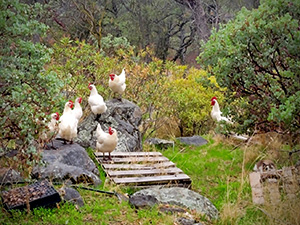
How a Small Farm Can Tackle Marek’s and Create Hardy, Disease-Resistant Bresse Breeding Stock
There are many diseases that can plague your flock, and Marek’s is one of the more prolific. As small farmers, we need to understand what Marek’s is and its symptoms. Importantly, how can we manage it with an economical and forward-thinking approach?
What Is Marek’s?
Marek’s Disease is one of the most common illnesses in small flocks. Generally, birds four to seven weeks old can become infected with Marek’s Disease by inhaling virus-laden dander. Once infected, they are infected for life. However, not all infected birds will get sick or even have symptoms. Marek’s is not acquired through the hatching egg. And it will not make people sick.
Symptoms
Marek’s Disease causes inflammation and tumors in the nerves, spinal column, and brain. In this form, birds will become paralyzed in the legs or wings, or may develop head tremors. Once paralyzed, they won’t be able to move around to get water and food and will starve and die of thirst.
When you observe any of your chickens starting to limp around, walk funny, or just seem off (you’ll get better at noticing these signs the more you’re around the birds), they must be culled from your flock. Do not continue to breed them even if they are vaccinated.
Using Vaccine to Manage Marek’s
The commonly recommended way to prevent Marek’s in your flock is to vaccinate your day-old chicks. The vaccine needs about four to seven days to work before exposing the chicks to other birds.
However, Marek’s vaccine can only help to lessen the severity of an outbreak if it should occur. The vaccine cannot prevent the bird from getting Marek’s. Another problem is the virus is constantly mutating – much like influenza and corona viruses throughout history. Therefore, your birds may be vaccinated against one strain of Marek’s but not the one that infects them.
If you are going to vaccinate your birds at home, you must take care to follow the instructions. These include:
- Thawing the vaccine for a specific amount of time and to a certain temperature.
- Using the vaccine no longer than 1-2 hours after reconstitution (as indicated on the label). This is because the live virus dies very quickly in vaccine form.
- Discarding any unused reconstituted vaccine after two hours. It can’t be stored for later use as the vaccine is no longer effective.
- Injecting the vaccine, usually under the skin.
One of the drawbacks to vaccinating at home is there are only a few companies and veterinary supply outlets selling single vials of Marek’s vaccine to small flock owners. The individual vials contain 1,000 to 5,000 doses of vaccine. The product arrives refrigerated with cold packs and must never be allowed to warm up while in storage. If the vials arrive warm, they are no longer effective. The vaccine must be refrigerated until used.
Vaccines Aren’t a Panacea
As mentioned above, chickens vaccinated against Marek’s don’t benefit from complete immunity. Scientists have discovered the vaccine has helped the virus become “uniquely virulent.” Over the last half century, symptoms for Marek’s have worsened. In other words, what was supposed to prevent severe symptoms has done the opposite. Paralysis is more permanent, and brains turn to mush faster. And the highly infectious and deadly virus spreads to birds faster from a vaccinated chicken than an unvaccinated one.
Even with mass vaccination among farms of all sizes, Marek’s disease has plagued the chicken industry causing two billion in losses annually.
Using Traditional Farming Practices to Manage Marek’s
In light of the high failure rate of the Marek’s vaccine, and the out-of-reach cost for most small family farms, what can we do as small farmers to create a hardy, disease-resistant strain? The answer is to create resistance through a stringent breeding program.
However, this method requires a very disciplined approach by the breeder. The term “cull ruthlessly” is used consistently by experienced breeders who are in the practice of resurrecting endangered species.
The goal is to breed for innate and adaptive immunity – a natural genetic resistance to the virus. In the lingo of breeding, we’re looking for birds with good constitution and vigor. Birds that survive past 7 weeks either don’t have Marek’s or have a natural resistance to the virus. This natural immunity is a trait that will be passed on to offspring.
You have to run a *closed* operation. This means do not bring any new birds onto your farm – even if vaccinated! Practice good bio-security measures. Always keep this in mind. Otherwise, you run the risk that vaccinated birds will spread a highly infectious variant of Marek’s to your flock.
It Will Take Time
Obviously, the downside to the selective breeding method is that it could take several generations to sort itself out. But ultimately, the benefit will be sustaining your heritage breed flock in the same manner they did prior to the advent of vaccines.
Breed with birds that have a proven track record of constitution and vigor. Your best bet is to breed birds that are two years old. The minimum age should be 9 months, preferably after a first molt. Chickens hatched from survivors of disease exposure are hardier and may carry natural antibodies that give them further immunity.
Remember the primary rule of thumb if you are going to employ a breeding program to improve the disease resistance of your strain: Cull.
- Cull anything that shows signs of sniffling, sneezing, or coughing.
- Cull anything that appears to be weak and feeble.
- Cull all birds that are poor eaters.
- Cull birds that do not have good confirmation of body and basic constitution and vigor.
- No exceptions!
In a few generations, you’ll pride yourself in a very hardy, disease-resistant strain.
To get started on the right track with your breeding program, I strongly recommend signing up for the The Breeders Academy. The website is a wealth of information, Kenny has decades of experience, and he’s a fantastic mentor. (We have no affiliation with The Breeders Academy other than being a member.)
If you’re interested in starting your own family of Bresse chickens, we have hatching eggs for sale.
